In a recent conversation, the person I was talking to outlined the purpose of central and local government in the most simple and clear way I have yet heard:
Central government is for nation-building. Local government is for city-building.
This was in the context of Auckland, so I would expand the local government definition to community-building, to cover those councils and authorities that are a little less urban.
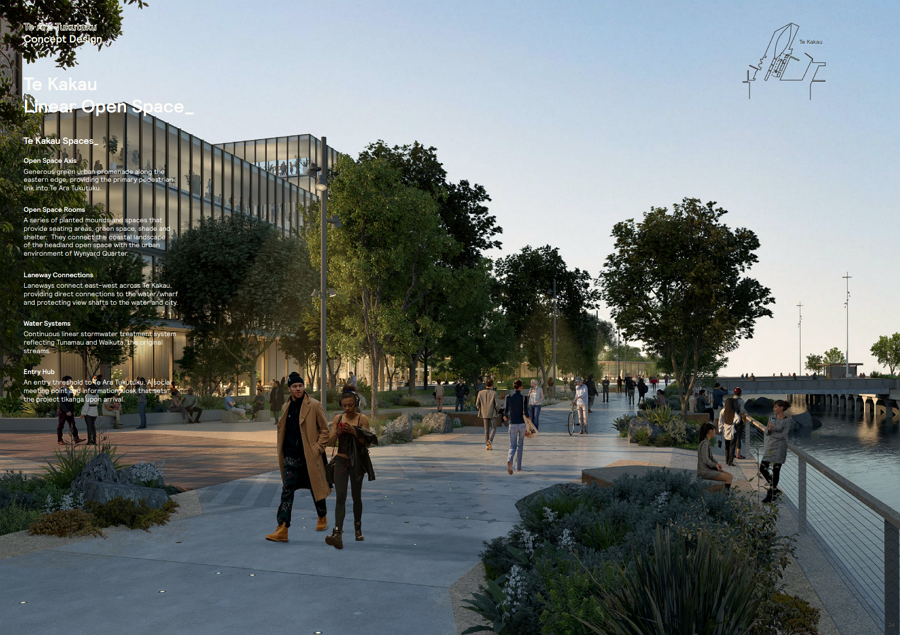
Unfortunately, successive central governments have failed at respecting this, and stuck their paws into meddling with city-building. Regardless of what they claim about ‘localism’. Yet if you take what has been said on face value, you could assume otherwise.
Take for example what an unidentified National party spokesperson said about city deals, just before the election last year:
“Local government has an important role to play. But, too often, councils are an after-thought for central government,”
Or some of Prime Minister Christopher Luxon’s comments about localism in the past, which Joel MacManus helpfully outlined:
For a prime minister who is often accused of having no ideology, localism is one thing Luxon deeply believes in. “Centralism over localism doesn’t work,” he told parliament last year. He described centralisation as “a robbery of power and control from local communities.” He reiterated it in his impressively boring speech at Waitangi this year: “We, like you, believe in localism and devolution, not centralisation and control.”
You might naturally assume, based on these comments, that the government Luxon leads would be all for councils having more power, more control, more resources, over what happens in their communities.
Instead, it appears that this government’s alternative to councils being “an after-thought for central government”, is to premeditatedly accept an invitation to stand in front of them… and spit directly into their face.
Not content with merely waging war on Auckland, yesterday Luxon decided to enact total war on local government, in a fury-provoking address to the Local Government NZ conference yesterday.
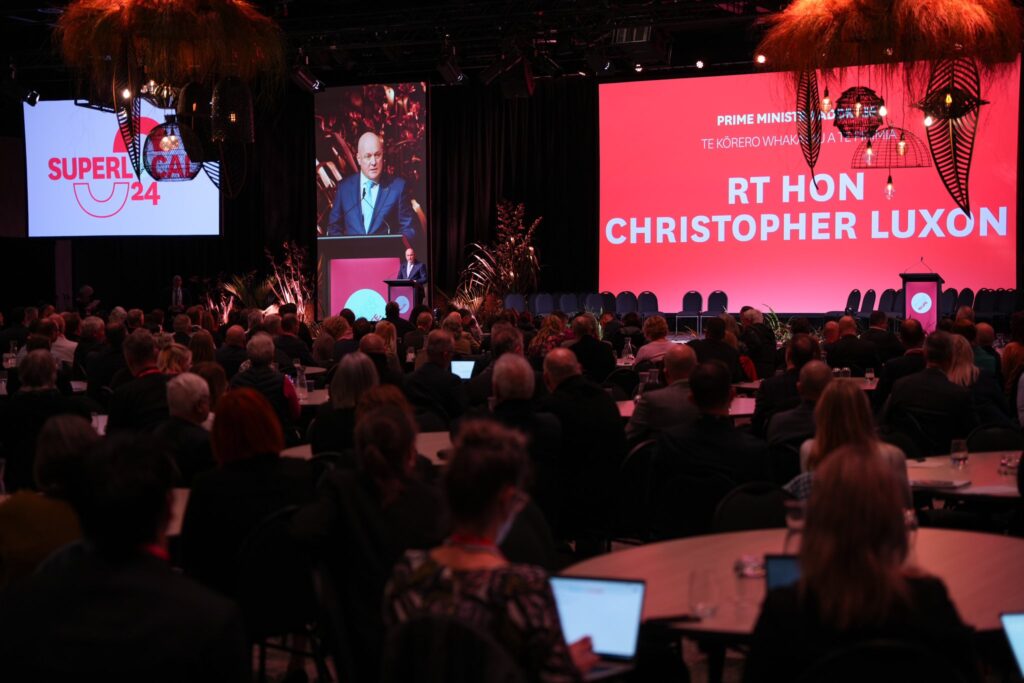
After saying he was going to be “blunt”, he proceeded to call the building they were gathered in a waste of money – to audible gasps and anger from the crowd –then rattled off a spiel about how sure, we will give you more money – but only if you do what we want and focus on “core” spending, and not vague notions of nice to haves. His speech went on and on about requiring more constraints on councils, in order for them to get more support. They needed to “tighten their belts”, he said; “rights and responsibilities”, he said.
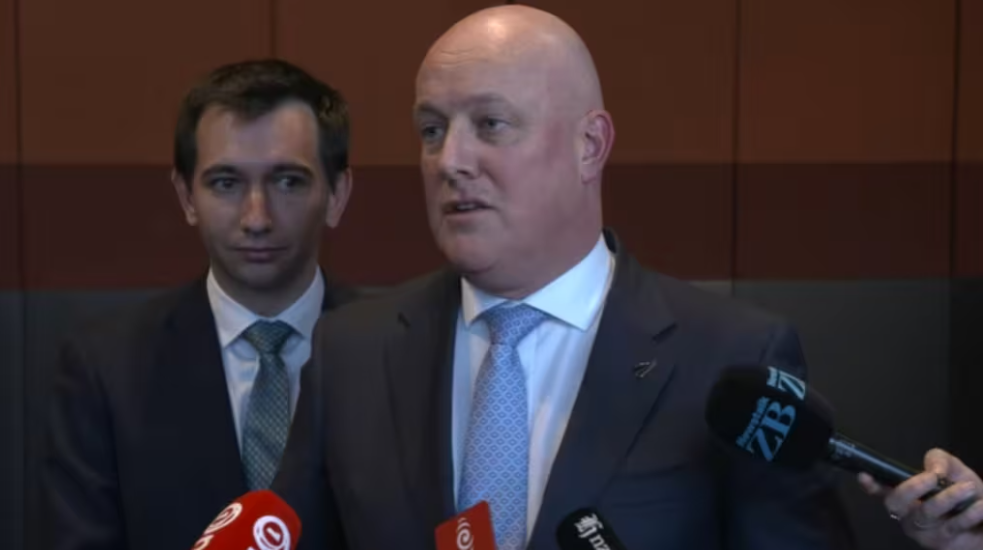
Fair to say the speech did not land well with the audience. Wellington Regional Councillor Thomas Nash described it as “one of the most mana diminishing, paternalistic and visionless speeches to a group of people I have ever heard”, adding:
He did not acknowledge Wellington’s Mayor or Chair or mana whenua who had welcomed him and others into the whare and then went on to insult the whare he had been welcomed into. Just astonishing for the Prime Minister of New Zealand in 2024.
He offered no positive vision whatsoever for the future of the country or for local government, simply talking down to the hundreds of people elected by their local communities with “I know best” criticism punctuated by vague references to regional deals and revenue tools.
He announced his plan to introduce performance targets for councils seemingly without realising that council LTP processes already do that job and are far more stringent and transparent on asset management, financial strategy, etc than anything central government agencies have.
And he said as part of his “back to basics” agenda that he is removing the four wellbeings from the local government act, taking social, environmental and cultural considerations out of councils’ mandates as if council decisions can ever be separated from “the basics”. So bad.
Auckland Councillor Richard HIlls drew out some of the implications of the speech:
Govt will limit councils’ ability to fund nice-to-haves? What does that even mean? The overwhelming majority of our budget already goes on infrastructure & govt requirements. Basic services. Do they want us to close our libraries? Stop events? Sell our parks? Stop pest control?
The government’s first action was to remove $1.2billion of funding we had allocated to major infrastructure. So we had to cancel projects and raise rates and borrow more instead.
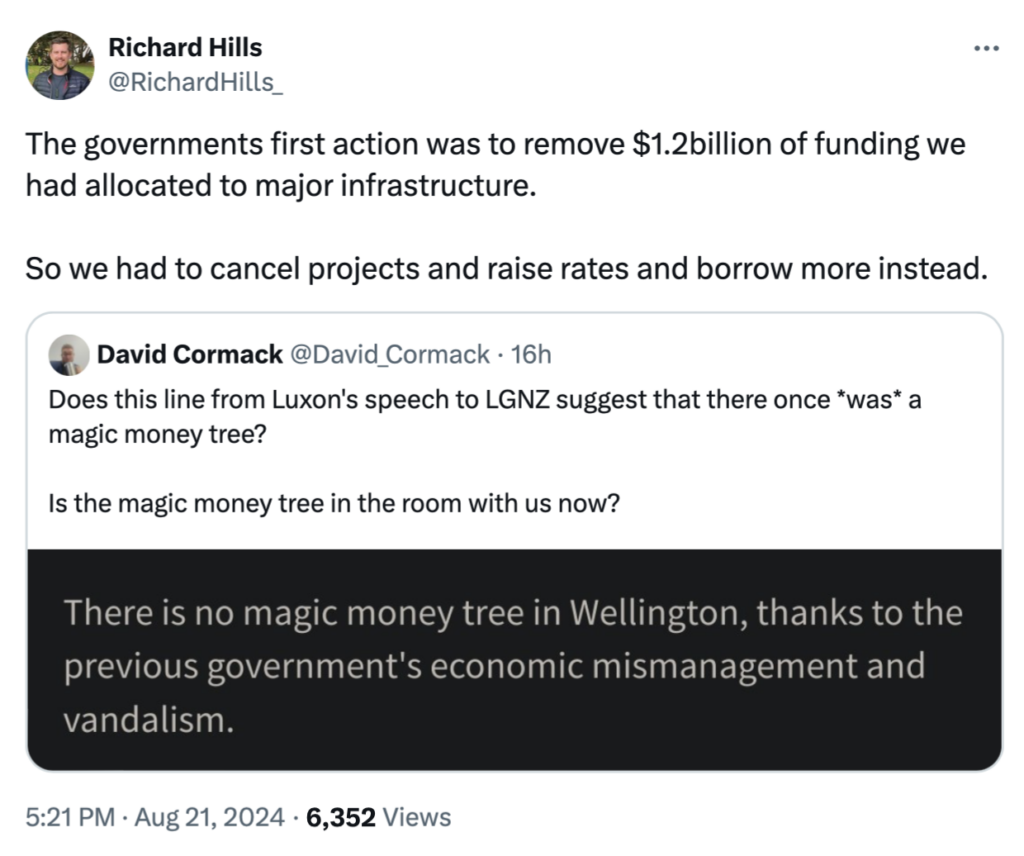
Underlying the speech, and every other time Luxon or Simeon Brown talk about local government, is an assumption that local government has been wildly spending money on fanciful things. Councils spend the vast, vast majority of their expenditure on core services like water, parks, transport, and community facilities. Yes, things are not perfect, there haven been issues, and a minority of councils have made poor choices. But on the whole they are incredibly constrained for resources and it’s clear that local government has been in dire need of reform for a long time.
Yet if helping local government and enacting reform is supposedly on this government’s agenda, why did they throw out the Future for Local Government report, which details all the issues and reforms needed? The Minister for “Local” Government Simeon Brown even had the audacity to blame the report’s existence on Three Waters – you know, that thing that National opposed for years because it thought it was undermining the localism principle.
Why ignore what Federated Farmers so eloquently said, as quoted in the Future for Local Government report:
“While trust is expressed by central government in the responsibilities delegated to local, the lack of support financially and logistically suggests local government has facilitated the transfer of many functions and costs from taxpayer to ratepayer.” – Federated Farmers
Why ignore the fact that local government has essentially not received any more significant taxation income, despite being required by central government to perform more and more functions?
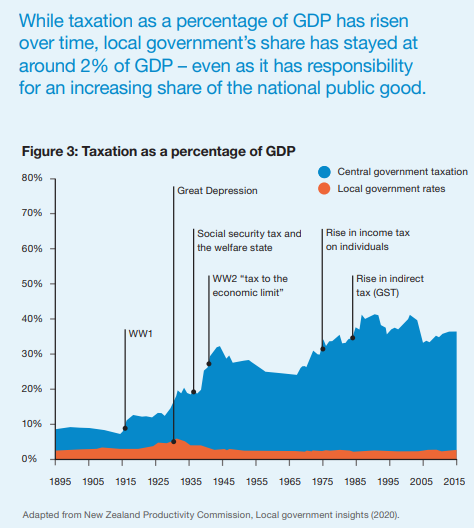
Why ignore that those “core” things councils should be spending on have been increasing year after year?
Why ignore the entire point of Auckland’s amalgamation – to become a “super city” with better resourcing and efficiency and a wider mandate?
Why ignore the fact that councils, unlike central government, are legally obliged to balance their budgets?
Why ignore that councils, all over the country, whether right or left or in between, are all raising their rates to pay for “core” costs?
The vision Luxon outlined to his audience was one of “we know best”. Now, despite all the talk of “responsibilities”, there is apparently no trust. The view, which Luxon decided to announce to a room filled entirely with people from local government, is that those who are most directly connected and accountable to their communities are somehow incapable of confirming and deciding that people want parks, libraries, safe roads, or literally anything that has an element of joy.
Because somehow, for Luxon and his government, roads, rubbish, and water are the only thing that matters.
Because somehow, if councils return to some mythical time where they only spend money on tarmac and pipes, our lives will magically improve and rates will instantly go down, and we would totally have better cities.
Because somehow, by removing the responsibility for councils to ensure the economic, social, cultural, and environmental wellbeing of the communities they serve, we will have a greater city.
When we unpack this beyond the words and sentiments, we can see exactly what they believe. Because although National, and Luxon, ran on and continue to allegedly support “localism”, their actions are showing they do not care about the views of local government, and local people.
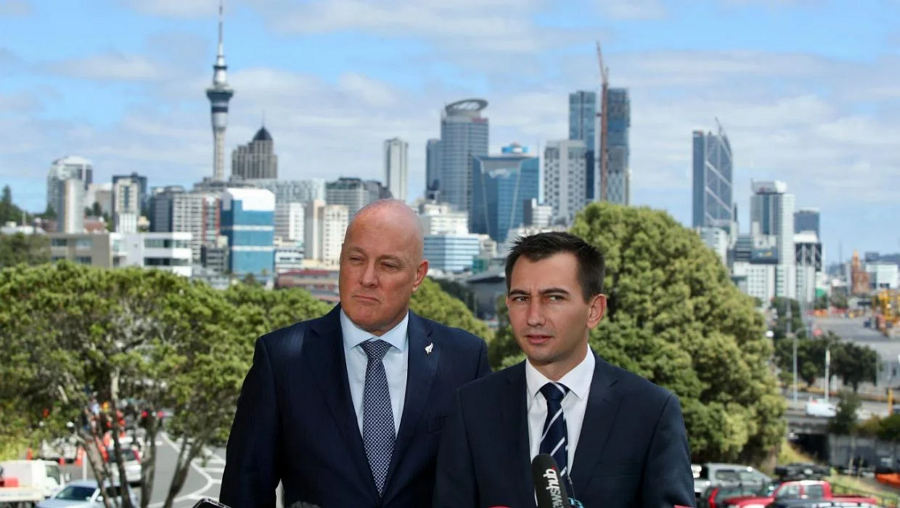
For Auckland, one of the first things this government did was remove $1.2 billion of transport funding by ditching the Regional Fuel Tax. This was funding that had already been allocated to projects, and canning it meant Auckland Council needed to raise rates more, and cancel projects.
This is the government that has decided to override decisions by local councils to implement Māori Wards, at fractious cost to the councils and communities. (Update: yesterday LGNZ voted overwhelmingly – with an an 83.5% majority – to push back on this.)
As Local Government New Zealand President Sam Broughton says:
“We think it’s complete overreach by central government. This is a coalition government that prided itself on talking about localism ahead of the election,” he said.
“Councils are more than capable of making these decisions themselves … and this is a backwards step.”
This is also the government that has decided to try and reverse speed limit reductions and road safety measures, regardless of the views of local governments and local communities.
This is the government that has skewed funding in their own ideological and backwards plan for transport in this country, to force billions of dollars of funding into state highways and roads that Auckland neither wants nor needs, while failing to fund public transport adequately. And they’ve done so with complete disdain for the views of Aucklanders.
Their actions show exactly what they mean when they talk about “getting back to basics” or making councils stick to “core spending”. For transport in Auckland this will mean more cars, cars, and cars. It means more congestion. It means wasting more of our lives and time, while holding this city, and this country, back.
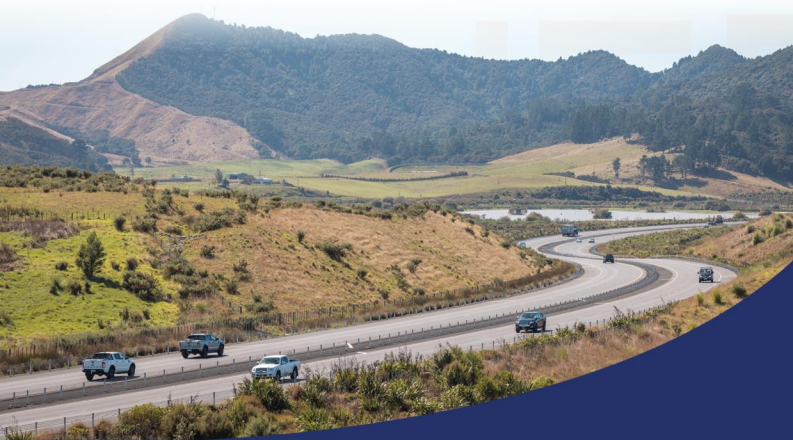
As Matt said earlier in the year when the government’s war against Auckland was first declared:
The idea of “getting back to basics” is extremely values-laden – after all, what can be more basic than being able to easily walk or cycle around your neighbourhood or city? This is something that most people are able to do freely, and doesn’t come with restrictions like needing a driver’s licence or being able to purchase (and maintain) a car. “The basics” are also not multi-billion mega-projects.
National’s basic vision would suck the soul out of our urban spaces. Cities are nothing without good design, without beautification, without proper infrastructure, and healthy travel options, and trees and plants, and playgrounds for children, and libraries anyone can visit and use. These are all the basic things that make our urban places where we want to go and live: they’re not ‘gold-plated’, they’re the serviceable stainless steel cutlery of everyday life. They get called “nice to have” (like that’s a bad thing!) and are slashed or value-engineered out of existence when times are tight. But they are an inextricable part of the fabric of good and healthy lives, and it’s essential to design our cities for people.
You don’t need to think that local government is perfect to understand this central government take isn’t normal. This government doesn’t care about what local people think if it differs from what Luxon, or the so-called “Minister for Local Government” and the rest think is best. This isn’t even about who you voted for, or what party you supported – this government does not care about what your community wants.
It does not care about fixing Auckland’s transport issues, it isn’t setting out a positive inspirational vision for Auckland and this country, and it certainly does not care about holding to its stated principle of “localism”.
I for one don’t accept their twisted and negative vision for Auckland, or for any place in New Zealand.
You don’t have to accept it either.
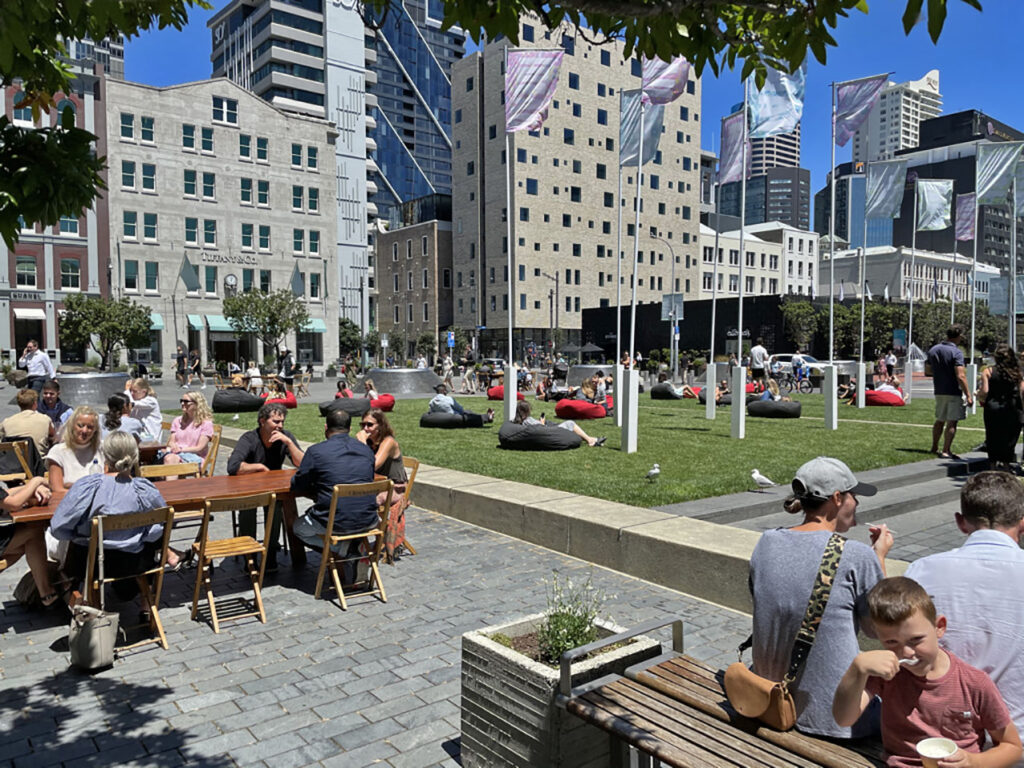
The reason I do what I do is because I fundamentally believe we all have the power to make a difference. And I dream of a better vision, for people, and full of life and happiness and soul.
If a war is being declared on us –a dreary future, choked by smog and trapped in traffic, a grey lifeless concrete jungle where children can’t safely cross the road – then the way we beat that is by working towards a positive vision.
Local government are our city-builders. They are the ones who should shape our city of Auckland, and all the other cities in New Zealand. They are the ones who should make decisions around what infrastructure we need, where our money should be spent, what we want our city to look like.
Even if they are not perfect. Because don’t get me wrong: for local government to work, we the people need to put in the effort to ensure it represents Auckland. If we want a greater Auckland, we need to work for it, and communicate our vision of our city where we can live, move, and connect.
So, consider this yet another sign to figure out where you can use your power, and do something. Get involved in projects and decisions in your community. Go send a message to your MP saying you support localism. Let your councillor and local board members you support their plans and you want more. Reach out to your neighbours, start a conversation, and work together to make your place as great as it should be.
Are you as fired up about this as Connor is? If you support our vision of a Greater Auckland, we invite you to help us to grow and spread our vision of a better city. Thanks to our existing supporters for backing our work!

 Processing...
Processing...
This Government must be one of the worst in the OECD, visionless, mundane, miserly and racist.
The only plus side to this is that is the Government are willing to take responsibility for Auckland then they are going to have to deliver some results, they won’t because they have no plan. Sadly I don’t have much hope of the majority of my fellow Aucklanders putting 2 and 2 together next election and voting them out. And all the progressive young people have left…we are leaving early next year for a couple of years, had enough of these idiots.
I wouldn’t get your hopes up, if they fail to deliver anything they’ll just lay the blame elsewhere and there will be very little journalistic accounting to correct the notion.
Auckland is the only city they genuinely care about
I am yet to see any evidence they care about Auckland.
Canada – “Hold my beer” (especially if Pierre Poilievre’s government gets elected next year).
Simeon Brown wants local authorities to put more effort into fixing potholes. But one reason the potholes have been increasing is through having more heavy trucks on roads – including local roads – and through the effects of climate change. Heavy trucks do not pay the full cost of damage to roads. And as the draft second Emission Reduction Plan shows, there is an expectation that the share of freight taken by trains will go down. Not helped by the Cook Strait ferry debacle. https://thefutureisrail.org/government-policy-risk
Even worse than that – when the Key govt launched their RONS Waka Kotahi went public about the huge funding shortfall and stated they would have to rob the national highways maintenance budget to deliver the projects.
Simeon is declaring war on the potholes Joyce, Brownlee and Bridges created
The National Party is astoundingly unfit to rule at present. Will its members and voters step up, and guide the party back to a respectful path, preferably with some sort of positive vision? Or are these destructive arrogant politicians going to bring down their party while they kneecap the country?
The polls tell National they can continue as they are doing. If anything the latest one is giving Luxon more room to be arrogant and show his true colours.
That said many ratepayers will not know the difference. His speech is pure politics – it says “as the shit hits the fan, blame the Council, not us”
Well the young are voting with the feet. The coalition will keep their support up because those clueless miserly old fogies who like them will hang around like a bad smell continuing to f==k us everything for future generations. What will they do when they find there is no city/country left for them to complain about. Porbably complain about how great the city used to be.
Even the international media are picking up on the exodus this coalition is creating.
https://www.dw.com/en/new-zealand-emigration-soars-amid-economic-woes/a-69975078#:~:text=Statistics%20released%20last%20week%20showed,getting%20on%20the%20property%20ladder.
This generational blame thing is as inaccurate as it is lazy bigotry.
Simeon’s 33 He’s closer to Gen Z than Gen X. Nicola Willis is Gen Y (and younger than Jacinda Ardern). Luxon’s 54.
I don’t blame you for being angry but direct the blame where it is deserved.
Destructive policy are not age determined
Is there data to show age group voting for the last election thats readily available? The ages of the politicians is irrelevant, its the base they are appealing to that matters.
The young are leaving in their droves there is no doubt about that, however the younger generation previous election turnout was much lower than the older generation as well, around 70% compared to 80% +
I’m still amazed that kiwis living in NZ voted in the shower of s**t.
No wonder so many of us live overseas with no plans to return home any time soon and with many more to join us.
I feel really sorry for all my kiwi whanau who saw through the BS of National and Act and recognised that even though labour had been poor at times, the opposition was much much worse.
This government is going to ruin NZ for generations to come, making everyone in NZ poorer and worse off.
small minded NZers will have to take the blame for it, especially the farmers who hold the country to ransom far too often (eg Three Water and pollution).
People are angry but I think Simeon Brown has been treating councils like this since soon after they won government. Some councils have pushed back and spoken out, but most have been too scared to. And it hasn’t received the press it deserved.
Ironically, Luxon’s speech here may be a boon – at least it’s clear where everyone stands.
Finally he is playing to his base, and his usual politiking. Just as with 3 Waters, by standing on the side, they can point fingers and blame. I called that a while ago.
The real question is which Councils voted for these tossers. Just like the police thought they were the party of law and order and would treat them well, everyone’s been hoodwinked.
What’s more concerning is how many Kiwis buy into this cheap marketing game.
Well, unfortunately, we do have to accept it – because there is no political alternative. The Labour Party is hopeless. Simply hopeless. On this, on all the reactionary vandalism and sheer bigotry and hatred coming out of this government, Chris Hipkins and the Labour Party have not been doing a damn thing. A half-decent opposition would have torn this 3 party coalition with a small majority apart by now.
When we’re back in the 1990s – in every sense of the term – all the blame must go squarely on Chris Hipkins and the Labour Party, for not even trying to fight.
This is exactly it. Labour are nowhere to be seen, real opposition would be publishing online calculators to show how much worse off people are under Natonal with all the things they’ve cut, holding press conferences, in the media anyway they could. The Greens aren’t helping themselves with all their silly ministers being ‘human’ as they keep saying. The coaltion have been given carte blanche but politicians and the media and the general public don’t care either way
Actually I think all they need to do is watch the coalition continue to shoot themselves in the foot. If you’re enemy is angrily shouting at everyone and calling them chumps and destroying the place sometimes you just need to sit back and watch the room turn against them.
So far they have lost the police, landlords, local govt, health professionals, education professionals, the civil service, environmentalists, anti-authoritarians, anti-debt brigade . And they have gained tobacco lobby, oil lobby, road forum lobby. Let’s see how that plays out at the next election. They are doing in one term what the Tories took 14 to do. I suspect they will end in the same place.
Probably this.
But I think we may see some mayors and LGNZ stepping up to be the de facto opposition now.
They’ve gone UP in the polls. This is what happens when there’s no opposition.
Arguably that is what happens when people perceive you are on the right track.
And anyone who has ever seen a council operate knows there’s more fat on them than a corn fed hog and a lot of money spent on pandering and pork barrel politics. And most people in local government wouldn’t survive 10 minutes if asked to run something as simple as a lemonade stand. So putting councils on a bit of diet and getting them to focus on core services and saving ratepayers some money is likely to be popular.
Being an opposition isn’t just about opposing things for the sake of it. It’s about having good alternative policies that sufficient people like better than what the government in power is doing. Until Labour gets back in sync with the electorate they’ll stay where they are.
It is the Labour Party’s fault. They spent the last term trying to find creative ways to make people hate them. National got in just by not being Labour.
I am surprised to see the PM did not acknowledged the hosts who invited him. Thank you author for bringing this up since I am deaf and do not hear everything. First rule when invited, always say thank you to the host.
Did you hear his speech, or read a transcript?
It seems clear to me that he did acknowledge and thank his hosts as this extract shows:
Rt Hon Christopher Luxon
Prime Minister
21 August 2024
Speech to LGNZ SuperLocal conference
Ka nui te mihi kia koutou. Kia ora and good afternoon, everyone.
Before I begin, I’d like to thank LGNZ for their invitation to speak here today.
Visionless is completely accurate. All this Government wants to do is cancel previous projects, support corruption in their vested interest industries so they have a Board role to go into in a few years time and build some hugely expensive and wasteful roads.
There is no vision, no optimism, positivity or anything.
Labour are nearly as bad as they don’t even bother to fight this.
I am tired of the huge list of things that the coalition parties claim to “believe” in and then undermine at every action. Their recent announcements on drug and drink testing covers their huge reduction in Police funding, including the “incentive payment” – effectively a cut in funding as they know that police won’t have the resources to meet the target.
Their claimed mandate is based on what they said in the campaign for the election. They have used this mandate to justify turning almost everything they said into a loss for citizens.
As the Apostle James put it: “What good is it, my brothers and sisters, if someone claims to have faith but has no deeds? Can such faith save them? Suppose a brother or a sister is without clothes and daily food. If one of you says to them, “Go in peace; keep warm and well fed,” but does nothing about their physical needs, what good is it? In the same way, faith by itself, if it is not accompanied by action, is dead.”
Ugly, little, men controlling our beautiful motu, after a good tenure of a sensible wahine. Somewhat similar to when Helen Clark was attacked for being without offspring. We still live in a backward little isle, obsessed with farming and rugby, activities that invoke true blokes, machismo, and all those other awful things that weak men have brought up on our societies.
It is a shame that we are losing protection for our Reo, for our people, and even our (relatively) progressive cities.
Once again I am ashamed to be a citizen of Aotearoa, an affliction that has affected me with most of our male prime ministers, in my lifetime.
Women are smarter than men, and those men who hide behind their ivory towers, their sand castles, their pulpits, are denying reality, science, and evolution.
We men need to concentrate on being good fathers, of raising our children to be respectful of all persons, and let the smarter sex take over our motu, we cannot out think them so why not join them. They are much better looking than us tane anyway eh?
bah humbug
That’s a particularly misandrist post that also stereotypes gender roles.
Whenever you write something like this, think how it would sound if you swapped the gender or race roles and if it doesn’t sound right when you do that you’ve probably got an unconscious bias issue.
This Luxon/S Brown duo are a dangerous thing. I wonder what’s coming next. I respect them as people but I think they are too politically immature for the power they have been given. Seems they think they have been given a mandate to do the opposite of the prior government due to winning an election that was mainly lost due to COVID which was common reaction all over the world. This is kind of the business man run government vibe (Trump) instead of the career politician vibe of Jacinda Ardern and others.
“I respect them as people”
Why? What have they done to earn respect?
I think the reality is, nationally, around 50% of people want speed limit increases. It all depends on where in what exact local area. There is strong support for speed reductions and measures to help slow cares naturally in a lot of areas. We can’t go off what some friend or group of people said at the BBQ either as it’s all coloured by your associations. I always laugh when politicians of any colour say “People that I met on the street tell me we want this…”, of course they will attract like-for-like comments & perhaps the odd heckle in the street to off-set that.
Yes saw your correction thanks.
At issue is that people want lower speed limits where they are and they don’t want speed limits to slow them down when they’re going someplace else. That of course is wishful thinking because your someplace else is where other people live and your desire for a higher limit in that some place else comes hard up against their contrary view.
For politicians to wade in and think they can resolve this dichotomy is fanciful. That Simeon Brown is attempting this reinforces the comment made above about his political immaturity.
On your idea that “people want lower speed limits where they are and they don’t want speed limits to slow them down when they’re going someplace else.”… It’s what we’re often told, Mr Plod, but it’s not what the public feedback showed, nor what the deliberative democracy feedback suggests.
People want a transport system that is safe to walk and bike around. They keep submitting that this is what they want. And when discussing it in an informed way with other residents, they continue to say it.
Voting is never about one issue. In fact it’s often not about issues at all, but about personalities of politicians or other factors to do with demographic alignment. Even when a voter is focused on the issues, it’s rare to find a party that is completely aligned.
Ok but you didn’t read the link I posted the public is clearly against lower speed limits. The NZTA surveys are great and all but they ask a question with a pre determined outcome. Just maybe consider the govt has gone UP in the polls not down UP since announcing the reversed speed limits.
The public is against lower speed limit on highways. Many of the changes from this government affect local/residential roads for which answers might be different.
More than 70% also said speed limits are about right or should be lower.
Projects in other cities have also shown that while there might be opposition against introducing traffic calming or low traffic neighbourhoods initially, this often turns to support after they have been implemented. Many people don’t like change and can only see the benefit of something new once they actually experience it.
Oh, and that is only according to this one article. It may be the actual truth but it is based on just this one survey.
Look JohnBGoode I appreciate you really want to keep these lower speed limits but only a small % wants them. You can tell I’m speaking the truth when my comments with proof linked into them keep getting deleted. I will once again post the link seeing as someone didn’t like the evidence it provided.Have a good look at the article even when people were asked “lower speeds to reduce accidents and fatalities” over 80% disagreed with the statement. https://www.thepost.co.nz/politics/350074748/public-politicians-dont-lower-speed-limits
Radar, that is still on State Highways, not local roads or school zones.
And this is also one survey – it MAY be true, but it also could not be. Consultation for local roads has shown that people are often in favor of lower speed limits there.
77% of people in the poll you cited agreed that speed limits in NZ are “about right” or should be lower. How does that fit your narrative?
I don’t know about the timing of National announcing speed limit reductions and the poll that showed them trending upwards. So an honest question – is there any proof that the polls went up immediately after this announcement and are not related to anything else or is the timing that well correlated?
I disagree with this government on almost all of their policies but some people seem to like them (even though I suspect that some of that is just to “own the libs” – still, that is their right in a democracy).
Local roads caused a huge amount of the silent majority to vote the way they did. Plenty of people changed their vote based on this terrible policy that ignores democracy. Reversing speed limits is a wildly popular policy. I’m sorry but the safer speeds experiment is over most limits will be getting reversed the govt has made that clear. Why are they doing this when the safety evidence says otherwise? Votes. Simple as that. This is quite a simple argument to win if you want lower speeds take it to the next election and if it’s so popular the party may do well or I suspect as the majority don’t want lower speeds that said party will drop in the polls.
“Local roads caused a huge amount of the silent majority to vote the way they did. Plenty of people changed their vote based on this terrible policy that ignores democracy.”
Interesting. I have never heard the media cite local speed limits as a major factor in the election. Could you share a link?
It isn’t the Council’s job to build a city. Developers, investors and residents built our city. It is the Council’s job to do the things we can’t do as individuals. But only the necessary things like pipes, water treatment plants and roads. There should be a law to stop them wasting public money renovating old buildings, building theatres and fancy stadia and on daft ideas like movie production stages or velodromes or all the other crap they like to get involved in.
The “just let capitalism solve all our problems” is a recipe to make the problems progressively worse for everyone except those who can afford to opt out of them.
Did you even read the article? A city with a plan beats an unplanned city every time. Nobody but the council is able to provide these things because they aren’t monetisable.
It has very little to do with having a plan and everything to do with money. Cities that people think are doing well have ever more creative ways of taxing people. Usually they are state or federal capital cities and can directly clip the tax payers’ ticket. Those cities with funding then write up a fancy plan to try and justify what they were going to waste everybody’s money on.
Best thing we can do is have central government pass laws restricting what local government can spend money on and then cap their budgets. Otherwise pressure groups act like pigs at a trough. Hence the Wellington Town Hall debacle.
I think that his support base with be applauding. All the money they will say has been wasted on cycleways. It’s always about the cycleways. Well as the author mentioned, he has well and truly shown his colours
I’m sure Heidi is more up on the surveys and stats on this than me. I was just guessing, perhaps averaging out in my head all the things I hear either way.
The article you linked to that I just quickly read seems to be more about *overall speeds* and *highways*. I think a lot of the lowering people are more agreeable on is just the slower speed arterials, connectors and local roads. esp outside schools or problem spots most would agree to lower them. So I think there can be a lot of cherry picking with facts and figures on these things we need to be aware of.
Oh this reply meant to be up before JohnBGoode’s @12:10pm and I agree with him.
That’s great Grant. But recent poll results suggest that no one wants lower speeds the govt went UP in the polls after announcing the speed reversals. I know it’s shocking many NZers care about time over safety it goes to show how important time is to people over anything else. I will post the link again seeing as my comment got removed for some reason. https://www.thepost.co.nz/politics/350074748/public-politicians-dont-lower-speed-limits
The decision should be evidenced based, not on polls.
I don’t think it’s any surprise the majority of people don’t want more speed limits. But.that doesn’t make it right.
We have a representative democracy and we elect people to lead, not follow popularity polling.
KLK the evidence is clear people want to drive at 50 not 30 and 100 not 80. It was a good experiment but it’s over. That evidence is just as good as any. You’re exactly right we have a representative democracy that is why speed limits are being reversed. It does make it right the only thing wrong would be ignoring the majority’s wishes.
So I guess we will have no speed limit increases on roads either, because no one practically chose that option either?
It’s a flawed poll because it’s not specific enough about what increases or decreases were relevant. 70% said “about right” which indicates that % aren’t opposed to some change.
“It does make it right the only thing wrong would be ignoring the majority’s wishes.”
Run a poll on eliminating income tax and get back to me with the results. On a safe assumption a majority would say yes, I guess the government should do that too.
Radar’s whole “democracy” broken record bit really seems to me like the common pattern I’ve seen; the old establishment, the people who’ve gotten their way under the status quo, throwing a fit at the slightest sign of their privilege being challenged. “Democracy” means them getting their way, “authoritarianism” means them not getting their way – that’s a consistent running theme.
Evidence should trump popular opinion and inform policy decisions especially where the general public is uninformed and/or selfishly motivated – definitely the case with anything to do with roads and driving in this country.
You want to get place-to-place faster? Better public transport, better walking and cycling, better urban design with more high density and mixed use zoning is the answer. Continuing down NACT’s clarksonesque death spiral of “moar cars” and “moar speed” is just going to lead to traffic jams where speed limit will be irrelevant cause nobody’s getting anywhere quick.
Radar, if you really want bikes and cars to coexist in the same road space, you *will* support 30km/h speed limits, because there is very clear evidence that you’re far more likely to survive being hit by a car at 30km/h than you are at a car driving at 50km/h. Simple as that.
And where did I say that they should be in the same space? I just said I want everyone to be able to go fast. You’re trying to base speed limits on a “what if” cars and bikes exist in the same space on the motorways in Sydney for crying out loud and the road toll is LOWER that’s before you mention the 80K arterials with no bike paths.
I have seen video clips of that motorway in question (the M2 isn’t it? the one with the busway/bus lanes in the median?) and I have never seen anyone riding bikes there. Nor have I seen bikes on the Waikato Expressway.
Infrastructure determines usage, and you are so caught up in a country that has been so heavily car-biased for so long you can’t comprehend anything other than what benefits you.
To get people actually walking and cycling you have to take away from the 99% slice of the pie that cars currently have. That’s not discrimination towards drivers; that’s *equity*. That’s undoing decades of car-biased social engineering.
30km/h on suburban streets, town centre streets and cul-de-sacs. 50km/h max urban limit when there’s dedicated cycleways. 70-80km/h for undivided highways with no median barrier, 100km/h for dual carriageway highways, and no higher than 100 because all evidence shows fuel consumption drastically increases above that speed.
That’s my stance. Go argue with the people at Vision Zero, International Transport Forum, and WHO who did the research if you disagree, because *that’s* what’s informed me.
Sincerely, someone who doesn’t give a rats ass about how fast selfish SUV/ute drivers want to go because I use public transport and I’m used to needing more time to get around a sprawling car-dominated city.
“To get people actually walking and cycling you have to take away from the 99% slice of the pie that cars currently have. That’s not discrimination towards drivers; that’s *equity*.
This is it in a nutshell. It’s not anti-car, its just sharing the pie a fraction more than the pitiful amount we do now”. It’s about one side of the table compromising just a little, compared to the other side which has been compromised for what 70yrs?
The technology exists to be able to implement direct democracy and efficiently hold referendums on just about anything vs having council members vote with perhaps the support of the people they represent or perhaps their own vested interests and agenda.
But stopping short of that at a national level perhaps if the process could be that if a group could collect sufficient signatures on a petition demonstrating enough people felt strongly enough about something a binding referendum on any subject could be held next election. Note that the difference compared to the occasional referendum New Zealand gets is that citizens, not politicians get to decide which referenda are voted on. Anyone with a bee in their bonnet can try to convince their fellow citizens of the benefit of their favorite cause. California does that and has for quite some time and it’s little more overhead the government side than just running the election since they all go on the same ballot paper.
In New Zealand we vote for a grab bag of policies and it’s a stretch to say that every person supports every policy of the party they voted for.
Holding binding citizen initiated referenda would put to bed fairly quickly the question of what people do and do not actually want and what the government has a legal right to do in any given area. Not following the will of the people in a binding referendum is not an option for them.
There was no referendum on increasing speeds. You can’t say the majority voted for it, all you can say is he has a mandate to pursue, but no obligation to implement. And that’s where your poll.comes in.
Only 20% of people were against speed restrictions per se. That’s nowhere near a majority of people explicitly “opposed”. What’s interesting is the 65% who said it was about right, which says no need for radical change but perhaps to do it in specific situations, because “about right” means room for movement up or down.
And if that 65% said the status quo was fine, and we are all about the polls driving policy, why are we increasing speed limits the local community has told their local politicians they specifically want?
And back to election wins, Brown campaigned on cancelling blanket speed restrictions (which were never really in place unless the community wanted it) and moving away from Labour’s command and control from Wellington in favour of “localism”. But by putting in a blanket approach of his own (the threat of legislation to councils who implement anyway) he has reneged on both. Undemocratic?
Well, I can tell you that I voted for Act…but I utterly detest the policy of the coalition on speed limits and transport generally. Noone should assume that transport ideals were a significant factor in their victory.
For the record my vote was 90% driven by my belief that Nat/Act have the best chance of saving our education system, which is literally the most important foundation stone of our society.
As someone who’s moved here from Toronto, Canada, I can see the writing on the wall when a city is being told to “tighten its belt” by a conservative government.
For a decade Toronto was run under austerity measures by a conservative mayor, and as a result nothing was kept up and the city ended up in a state of shabbiness, which looked awful to visitors and was awful for residents. Of course, money was found for an unnecessary urban motorway megaproject though.
I don’t want to see another city I live in to fall in the same hole.
https://www.cbc.ca/news/canada/toronto/austerity-budgets-trend-critics-2023-1.6714383
The current Government transport vision, foresight, planning evidence (if there is any) and GPS……………..must be the worst in living memory. Prove me wrong – go on I dare you. Heard that auckland has the highest rate of car ownership in the world. If Akl grows circa 300,000 people in the next 10 years as forecast then just wait for transport network performance to turn into Carmageddon.
I am consoled as their almost total idiocy will collapse under the weight of its own hubris.
it’s hard not to want to see NACT suffer from the consequences of their actions – more traffic jams, a loss of produce-growing land to sprawl, and a failing economy.
Unfortunately at this point I think they’ll still manage to find a way to blame it on “liberals/leftists/immigrants/greenies” somehow; the modern right is incapable of taking responsibility.
Hmm – how many of you that are so upset have ever considered voting National? or ACT?
I get that green party members are upset, National has as they promised during the elections rolled back most of the green agenda. But is this such a surprise? They are delivering exactly what they promised.
Personally I am very disappointed with what the last Jacinda government did (or more not did). They truly were an incompetent bunch that despite an overwhelming mandate got absolutely nothing done. They forgot about the middle of NZ (hence National will have a run of election wins now), and For us in Auckland, the prestige big ticket items that were promised back in 2017 went nowhere. The lightrail got institutionalised, the promised Northwestern busway remained a pipedream and the harbour bridge is still wo its cycle lane. Those were projects with good support from the majority of Aucklanders, including the middle class, and they were not delivered, in anyway or form.
That made me loose all faith I had in Jacinda and her cadre of politicians that had never worked in reality, and most had parents who surprise surprise were also career politicians. Hence no surprise that Labour lost most of their Auckland bench. Loosing electorates that’s been red since our brave war generation returned home after serving our country in Europe and Asia. I want none of it, again.
Now Luxon or Seymour is not my people, I didn’t vote for them, but if I did, I’d be content with them delivering their election promises one after another. And to rub salt into things and remind us of the previous, useless Auckland based transport ministers, we just had Simeon Brown at Westgate putting the shovel down for another improvement to the NW busway. The NW busway that Labour never got anywhere…
Luxon putting his foot down, saying that councils are wasting money and examplifying with Wellington and the building they were standing in wins votes. Most New Zealanders have felt a squeeze on their finances and the last thing that the middle class of this country wants to see is wasteful spending (conference venue) when basic services aren’t delivered (see water and waste in Wellington). Hence in my book, Luxon will win more votes on that speech, not less. He wont win green votes, he’ll sin middle class NZ votes and those tend to be the ones that sadly win elections.
Notwithstanding some blame on the prior Labour govt, there was one thing that stopped a lot of things from getting delivered. It was called COVID.
And the hand brake that was nz first